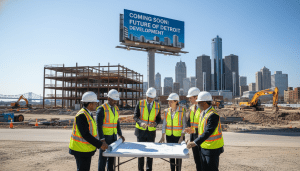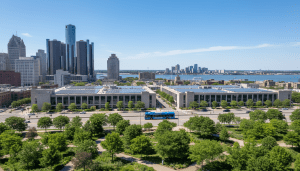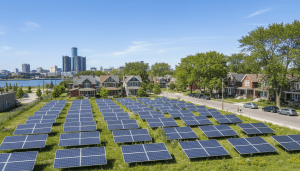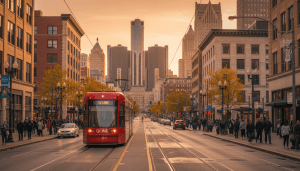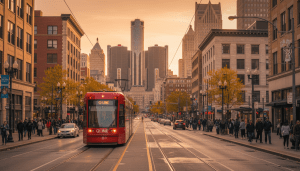Why Invest in Detroit 2025? Because this is the year Detroit’s revival goes from buzzword to balance sheet reality. Investors from across the country are looking at Detroit’s booming real estate market, revitalized downtown, growing tech sector, and surging tourism numbers — and they’re seeing not just potential, but performance.
This guide dives deep into the economic, cultural, and infrastructure trends shaping Detroit’s future and explains how savvy investors can position themselves now for long-term growth. Whether you’re a seasoned real estate pro, a business owner seeking a new market, or a first-time investor curious about emerging cities, Detroit in 2025 offers a mix of affordability, stability, and upside that’s hard to find anywhere else.
Why Invest in Detroit 2025: The Macro Picture
Detroit is no longer the “comeback city” — it’s a growth city. Consider the data:
Population stabilization: For the first time in decades, Detroit’s population is holding steady, with growth in key neighborhoods like Corktown, Brush Park, and Rivertown thanks to new housing options and jobs.
Economic resurgence: Metro Detroit added thousands of jobs in 2024, with unemployment trending below the national average.
Massive investment: Billions of dollars have been poured into redevelopment projects like the Hudson’s Detroit skyscraper, Michigan Central Station’s tech campus, and new hotel openings.
Strategic location: As an international trade gateway with proximity to Canada, Detroit sits at the center of North America’s logistics network.
In short, Detroit 2025 isn’t just about nostalgia — it’s about growth backed by fundamentals.
Detroit Real Estate: Where the Smart Money Is Going
One of the biggest reasons to invest in Detroit 2025 is the city’s real estate market. Despite appreciation over the past few years, Detroit housing remains far more affordable than Chicago, New York, or San Francisco — meaning investors can still find bargains with strong cash flow potential.
Downtown & Midtown Core
Luxury living: High-rise condos and mixed-use buildings like the Residences at Hudson’s are attracting professionals and even out-of-state remote workers who want urban amenities without New York prices.
Rental demand: The influx of young professionals is driving demand for 1–2 bedroom rentals near QLine stops and walkable areas.
Short-term rentals: Tourism growth has created a profitable market for Airbnbs and furnished corporate rentals.
Neighborhood Hotspots for 2025
Corktown: With the Ford-backed Michigan Central campus fully active, this neighborhood is a tech-and-innovation hub. Rehabbed row houses and new builds are appreciating fast.
Brush Park: Once filled with vacant mansions, this area is now a thriving residential district with new condos, townhomes, and restaurants.
Jefferson Chalmers & East Riverfront: Waterfront access and new greenway links are boosting property values.
North End: An emerging neighborhood benefiting from proximity to Midtown and transit corridors.
💡 Investor Tip: Look for properties within walking distance of the Joe Louis Greenway and Dequindre Cut extensions. Walkability has a direct impact on resale value.
Detroit Commercial Real Estate & Business Opportunities
Why Invest in Detroit 2025 if you’re thinking beyond residential property? Because the city is undergoing a commercial transformation:
Office Space: Demand for flexible, hybrid office spaces is steady, with creative firms and startups seeking collaborative environments.
Retail: District Detroit and downtown corridors are filling with dining, entertainment, and boutique retail options.
Hospitality: 2025 sees multiple hotel openings, including both luxury and boutique brands, a sign that tourism and business travel are on the rise.
Industrial: The EV manufacturing boom is fueling demand for warehouses, distribution centers, and light manufacturing facilities near major freeways.
Detroit’s Innovation & Technology Ecosystem
Detroit isn’t just cars anymore — it’s code, robotics, and clean tech.
Michigan Central Innovation Campus: This 30-acre campus is bringing together startups, researchers, and major players in mobility tech.
Newlab Detroit: Incubates companies working on robotics, automation, and urban tech solutions.
Talent pipeline: Wayne State, University of Michigan, and MSU are supplying a steady flow of engineering and computer science grads.
Venture Capital: VC activity in Detroit doubled from 2020 to 2024, and 2025 is on track to break records.
Tourism and Experience Economy
Tourism is now a $6+ billion annual contributor to Detroit’s economy. More visitors mean more demand for hotels, restaurants, retail, and entertainment — creating a virtuous cycle for investors.
Major Tourism Drivers
Events: Detroit Jazz Festival, Movement, NFL Draft legacy programming, and the Auto Show attract global audiences.
Culture: The DIA, Motown Museum, and dozens of smaller galleries draw culture-seekers year-round.
Riverfront: The award-winning Detroit Riverwalk and new Ralph C. Wilson Park expansion are major draws.
Infrastructure & Connectivity: The X-Factor
No investment story is complete without infrastructure. Detroit is making major strides here:
Free People Mover: Fare-free rides have made it easier for residents and tourists to get around downtown.
Greenways: The Joe Louis Greenway and Dequindre Cut expansions are linking neighborhoods and boosting recreation-based tourism.
Public Spaces: Parks, plazas, and outdoor venues continue to get upgrades, making Detroit a more livable, walkable city.
Risk Factors & Smart Strategy
No city is risk-free — and Detroit is no exception.
Neighborhood variation: Some areas are still struggling with vacancy and blight.
Property taxes: Higher than national average, though reform efforts are underway.
Economic cycles: Detroit remains tied to the auto industry and can be vulnerable to downturns.
The key is careful research, picking the right neighborhoods, and diversifying holdings.
How to Get Started as an Investor
Do Your Research: Study neighborhood-level data, not just citywide averages.
Connect Locally: Network with Detroit Economic Growth Corporation, local REIA groups, and neighborhood associations.
Consider Partnerships: Joint ventures with local developers reduce risk and speed entry.
Use Incentives: Leverage Opportunity Zones, historic tax credits, and brownfield incentives where possible.
Think Long-Term: Hold property for 5–10 years to capture full appreciation potential.
The Bottom Line: Why Invest in Detroit 2025
Detroit isn’t just recovering — it’s leading a model of urban revitalization that other cities are watching. With affordable entry points, strong economic drivers, and an ambitious development pipeline, 2025 is the year for smart investors to take a serious look at the Motor City.

